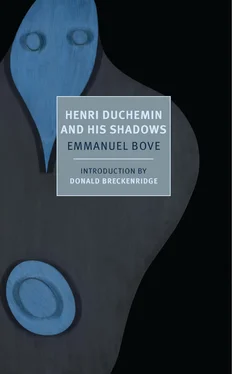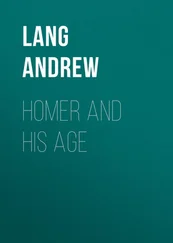I have an idea. Tomorrow morning I will carry it out. And then you will be forced to understand. Above all, do not say a word.
It has to remain a secret so that no one will bother me. I will walk along the Seine, and then, well, never mind, I would rather not tell you anything now. I have my idea. No doubt everything will happen as I imagine it. And tomorrow I’ll tell you what I did.
On the train taking me back to the village I had left five years earlier, all was silent. The heat was stifling on this July afternoon. The sun’s rays must have been keeping pace with us, for otherwise—based on my memories of the long minutes I had spent motionless, magnifying glass in hand, browning sheets of paper—I would have been surprised that the sun was as strong shining through the windows as it would have been had the train come to a standstill.
I drew the curtains, which were the same color blue as the flagpoles. It was only three o’clock. I was unsettled by the idea that time was not passing more quickly even though we were traveling through the countryside faster than a man on foot.
Occasionally, in those spots where the rails were smoother, it seemed as if we weren’t moving anymore. Only the metal ring of the alarm trembled, as if the jolt that had set it in motion had been strong enough to make it sway for several hours.
My natural apprehension prevented me from placing my feet on the foot warmers: perhaps they had become boiling hot since a few moments earlier when I had leaned over to feel them with the outer edge of my fingers, the most sensitive part. I imagined it would not have taken more than the flick of a switch by some conductor, in the head or rear car, for the heat to have been turned on again in the interval. This flick, I feared, could have occurred while the conductor was distracted, smoking a cigarette or reading the paper.
Through a window, held half open by a strip of cloth (cloth because of an administrative decree from 1917, when the soldiers had been cutting off the leather straps to use as uniform belts), the artificial wind of speed penetrated the compartment, coating our hair with coal dust. Field insects sometimes fell on the seats, slipping between the cushions as if into a chasm, which made me feel sorry for them like I did for the little worms in lettuce carried off by water from the faucet toward some dark sewer.
The tunnels came in series, like everything in life, like good luck and bad. Not knowing how long they were, I would hesitate to close the window. The smoke would surround us and, long afterwards, the taste of it remained on my tongue.
My neighbor was sleeping. At times he moved like a man awake, even though he kept his eyes closed. He would take a handkerchief out of his pocket, nodding his head, blowing his nose, all while he slept. Some remote force was commanding his limbs to move in order to find a comfortable position, but faltered when it came to tidiness and propriety. In a small railway station, the train stopped for three long minutes, which, even though they were scheduled, seemed to delay my arrival by three minutes.
When the passengers who disembarked had reached the road, we pulled out again. Bags in hand, they watched us go by.
From high up on a railway bridge, closer to the only cloud, the front tip of which was pointed so it could cleave through the air and follow us, we glimpsed small valleys, hillsides. In the distance steeples rose, their weathervanes crooked. The cars on the road seemed to be following a longer path.
We were traveling through an inhabited countryside where fields followed villages, a countryside furrowed by small streams crossed by wooden footbridges from which men were fishing.
This was the countryside of my youth, of illustrations to help you learn German, in which every object the small farmer uses is in its place, and nothing is lacking.
There were grindstones, wheelbarrows, thatched cottages, pitchforks, two horses pulling a plow, herds of cattle.
Cows grazed, chasing flies with their tails. Foals stopped in front of hedges, rearing up without danger to anyone in the vast pastures. An old woman carried a bundle of firewood so that the word “bundle” would stick in the children’s memories more easily.
The landscapes we passed through—each of us thinking of arriving or departing, each of us filled with expectation or farewell—this countryside where we would never go except on train tracks unless by some impossible chance, but which cheerfully went on with its life nonetheless, filled me with melancholy.
A newspaper, which no one had bothered to fold back up and which had been tossed a number of times because it would not land properly, lay on the floor.
I tended to look for the absurd in everything, so I picked up this paper, bought in Paris in the morning and now doubly aged by time and distance, and attempted to find some stories from this countryside in it, stories whose journey had been pointless because I was bringing them back whence they came.
The people working in the fields had not yet read this newspaper. Being better informed than they were, carried along at uniform speed through landscapes where I would have stopped had I been alone, witnessing a rural life as private as the one inside houses—all this prompted me to dream, eyes half-closed, legs crossed so that no fatigue would bring me back to reality.
Passengers moved through the corridor in the direction opposite the train’s, fearful as they walked between cars, gaining a few steps on the ground as we lost a thousand in the countryside. We did not have time to see the clocks in the stations. A train passing us in the other direction caused me a dreadful fright.
I was leaving behind friends whom I had not forewarned, as well as my landlady, because I am unable to part company forever with even the most insignificant people.
I was leaving behind a young woman, Julienne, whom I loved and whom, only nine hours after my departure, I already missed, and who seemed to me to have so many fine qualities, as if we had been separated a long time.
I was leaving behind a dark office where only one window looked out onto rue Drouot, and five others onto an inner courtyard. The window facing rue Drouot was not for me. I would have had to wait for seven employees to leave in order to become the most senior and sit anywhere near it.
I was leaving behind habits, odd little ways born of poverty, sudden awakenings in the half-light, the fear that people would not return what I had loaned them, bad restaurants, and indigence at month’s end, prolonged by a day every month, that inevitably would have led me to total destitution.
I was leaving behind an ordered life, so well ordered that I was surprised, now, that it no longer existed. The person who would take over my room would not get up at the same time as I had. I would no longer buy my rolls at the neighborhood bakery. No one would see me anymore. In a month, after the customary time of an illness or a vacation, perhaps people would think of me for a moment, and then it would be over.
I was also leaving behind things, old things I had believed useful, and that I had never wanted to get rid of, even when I changed rooms: a pair of trousers, a metal can, a perfume bottle that was empty but made of heavy glass, photographs, worn-out shirts, letters and envelopes—I cannot tear up a letter, and I always keep the envelopes as if, without them, the letters would not be letters.
I had left everything. I was carrying only new things in my new suitcase. My brushes were wrapped in the day’s newspaper. I did not want anything to remind me of my life in Paris and wanted to focus my attention solely on driving out bad memories.
I was returning to my family. I, their son, their brother, was going to see them again. In an hour, I would be among them. At first they would not recognize me. Then, with tears of joy, my mother would hold me in her arms—but not for long, because she would go fetch my father to tell him the good news.
Читать дальше












